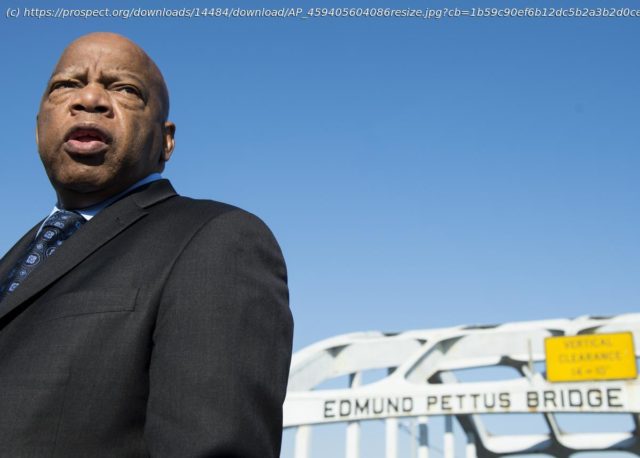The life of the civil rights icon, who died Friday from cancer, is a testament to perseverance.
Bill Clark/CQ Roll Call via AP Images
John Lewis stands at the Edmund Pettus Bridge in Selma, Alabama, 50 years after he was beaten there on Bloody Sunday in 1965.
In 1965, as chair of the Student Non-Violent Coordinating Committee (SNCC), 25-year-old John Lewis led 600 protesters on the first march from Selma, Alabama, to Montgomery, to intensify pressure on Congress to pass a federal voting rights law. Alabama state troopers, ordered to Selma by segregationist Gov. George Wallace, attacked the marchers as they crossed the Edmund Pettus Bridge. Lewis was beaten so severely that his skull was fractured. “I thought I saw death. I thought I was going to die,” Lewis recalled later. That day, March 7,1965, came to be known as “Bloody Sunday,” and television coverage of the massacre stirred the public’s conscience. Six months later, President Lyndon Johnson signed the Voting Rights Act into law.
Lewis would later become a 17-term member of Congress from Atlanta, and on Friday, he died of cancer at the age of 80. That night, Americans watched federal troops, sent by Donald Trump, invade Portland, Oregon, following 50 days of protest against police violence and racial injustice. Peaceful protesters were arrested, forced into unmarked cars, and detained in jail, despite the insistence by Oregon’s governor and Portland’s mayor that the troops were violating civil liberties and inflaming the situation, and should leave. At least one protester suffered a fractured skull at the hands of troops, just as Lewis did 55 years earlier. The Portland massacre is likely a trial run for similar actions in other cities. It is too soon to know if public outrage over Trump’s assault on basic rights will help stir voters to defeat him in November.
In 1965, Lewis was a young radical, impatient with the pace of change around racial injustice. At his death, he was still a radical, supportive of the new generation of activists and the upsurge of protests around the country since the Minneapolis police murdered George Floyd in March. Had he not been ill with cancer, he almost certainly would have participated in Black Lives Matter protests. As he told CBS in June about the nonviolent protest moment, “There will be no turning back.”
“My philosophy is very simple,” Lewis says in the film. “When you see something that is not right, not fair, not just, say something. Do something. Get in trouble. Good trouble.”
More from Peter Dreier
Lewis’s physical and spiritual courage would be tested many times. Each time, he revealed a remarkable, calm discipline, galvanizing others to follow his lead.
Soon after Donald Trump was elected president, Lewis told an NBC interviewer that “I don’t see the president-elect as a legitimate president.” The next day, Trump responded over Twitter, saying Lewis was “All talk, talk—no action or results. Sad.”
Your donation keeps this site free and open for all to read. Give what you can…
SUPPORT THE PROSPECT
In 1958, Lewis attended a weekend retreat at the Highlander Folk School, a training center for activists in rural Tennessee, where veteran activists helped him visualize what could happen if thousands of poor working people were galvanized into direct action. “I left Highlander on fire,” Lewis recalled.
When he returned to Nashville, he joined other students to ask local stores to voluntarily desegregate. When they refused, the students began preparing for civil disobedience, drawing from the work of James Lawson, a divinity student at Vanderbilt University, who taught workshops on nonviolent social action. In February 1960, Lewis participated in one of the first lunch counter sit-ins. Day after day, Lewis and other students—Black and white—sat silently at Woolworth’s and other lunch counters, where they were harassed, spat upon, beaten, arrested, and held in jail. The students insisted that they continue, and Lewis played a key leadership role. Eventually Nashville’s mayor and business leaders agreed to desegregate the downtown stores—the first Southern city to do so.
“My philosophy is very simple,” John Lewis said recently. “When you see something that is not right, not fair, not just, say something. Do something. Get in trouble.






